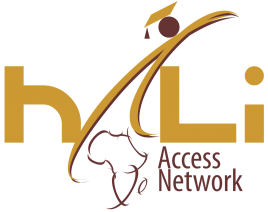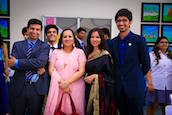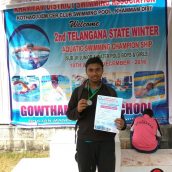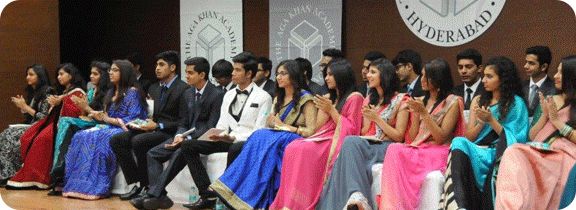
International Baccalaureate
The International Baccalaureate (IB) is a non-profit educational foundation, motivated by its mission to create a better world through education. IB programmes for students aged 3 to 19 help develop their intellectual, personal, emotional and social skills to live, learn and work in a rapidly globalising world.
The Aga Khan Academy Hyderabad has been authorised as an IB World School offering the IB Primary Years, Middle Years and Diploma Programmes.
IB World Schools share a common philosophy – a commitment to improve the teaching and learning of a diverse and inclusive community of students by delivering challenging, high quality programmes of international education that share a powerful vision.
Aims of the IB programme
Founded in 1968, the International Baccalureate currently works with schools in 144 countries to develop and offer their programmes to over one million students.
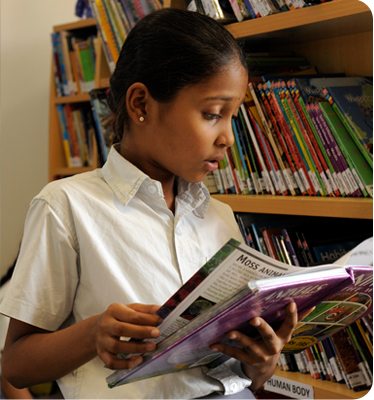 The IB mission statement declares:
The IB mission statement declares:
"The International Baccalaureate aims to develop inquiring, knowledgeable and caring young people who help to create a better and more peaceful world through intercultural understanding and respect. To this end the organisation works with schools, governments and international organisations to develop challenging programmes of international education and rigorous assessment. These programmes encourage students across the world to become active, compassionate and lifelong learners who understand that other people, with their differences, can also be right."
Primary Years Programme
The Primary Years Programme (PYP) at the Academy, for students aged 6–10, focuses on the development of the whole child, addressing social, physical, emotional and cultural needs, while giving students a strong foundation in all of the major areas of knowledge. Through the PYP, children become aware of and sensitive to the points of view of people in other parts of the world.
Middle Years Programme
The Middle Years Programme (MYP), for students aged 11–16, integrates the study of all the major disciplines, including languages, sciences, literature and the social sciences, mathematics, arts, technology and physical education. The MYP normally includes a service component designed to encourage students to become involved with their communities.
Diploma Programme
The Diploma Programme (DP), for students aged 16–19, is a two-year course of study that prepares students for university. All DP students study languages, a social science, an experimental science, mathematics and, usually, an arts subject.
At the same time as it provides a form of academic passport, the DP generally fulfils the requirements of a student's national education system. Each student's performance is evaluated by independent examiners and measured by his or her levels of knowledge and skills relative to set standards applied to all schools.
For further information about the International Baccalaureate and its programmes, please visit the IB website.
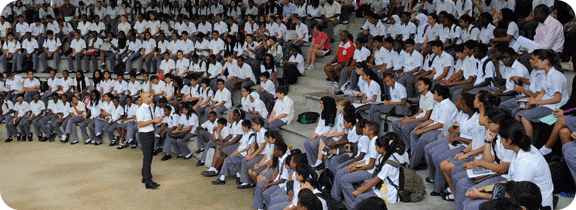
The Junior and Senior Schools
The Aga Khan Academy Mombasa is made up of two schools, the Junior School and the Senior School, which together cater to students from year 1 (age 6) to university entrance.
Junior School
We currently welcome 181 day students in the Junior School (years 1–5), most of whom are from the local area. All Junior School students follow the International Baccalaureate (IB) Primary Years Programme (PYP). Through the PYP, our students learn to be confident, independent and creative learners.
The Junior School building has been designed to address the needs of younger children, with age-appropriate facilities and classrooms. In addition to the PYP classrooms, the building contains the Junior School library, and music, art and information technology rooms. There are also large playing fields and an adventure playground.
Senior School
The Senior School currently houses over 500 students. Those from the local area attend as day students, while those from other parts of the country or region live on campus as part of the residential programme.
Students in the Senior School pursue either the IB Middle Years Programme (MYP) or the IB Diploma Programme (DP).
The Middle Years Programme is for students in years 6–10. It helps them master essential skills and knowledge, and teaches them to be critical and analytical thinkers.
The Diploma Programme is offered to students in the final two years of school. It is an internationally recognised and demanding programme that prepares students for university entrance.
The school caters to both the intellectual and personal growth of students.
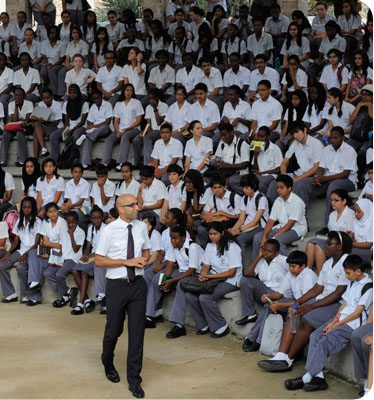
The Senior School has a wide range of facilities that include:
- Laboratories for the sciences as well as for home science and computers
- Art and music rooms
- Library and resource centre
- Religion and culture room
- Career counselling centre
- Design and technology workshop
- Student and teacher lounges
- Theatre
- Multipurpose hall
- Cafeteria and dining area
The building is networked so that computers become common resources for teachers and students. The multipurpose hall can be used for a variety of events ranging from theatre productions to parent-teacher meetings. The school also has swimming, basketball, badminton, volleyball and gymnastics facilities as well as playing fields for soccer, field hockey and athletics.
For further information about applying to any of the programmes offered at the Aga Khan Academy Mombasa, please refer to the admission requirements.
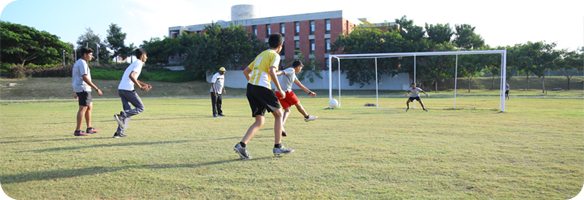
Enrichment Programme
The enrichment programme enables students to realise their potential in a variety of settings beyond the classroom. Students develop a sense of self-awareness and an understanding of school and community needs and opportunities. They also learn how to apply their gifts and skills to make a positive impact.
At the Academy, we believe in a balanced, rounded, comprehensive school experience. As this includes both academic and enrichment experiences, we encourage our students to do their best both in and outside the classroom.
We offer outstanding sports facilities that include:
- swimming and diving pools
- cricket pitch
- sports fields, for soccer, hockey and athletics
- tennis and squash courts
- athletics track.
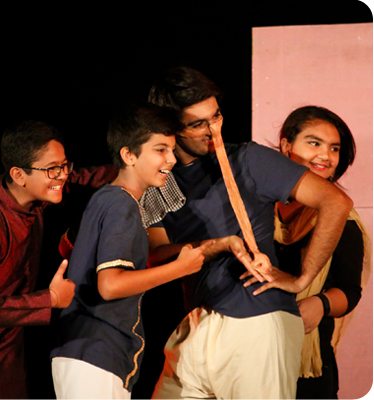 Children with special sporting gifts are encouraged to develop their talents in every way. Children with special gifts in music, art or drama are similarly encouraged through opportunities to practise and perform while at the Academy.
Children with special sporting gifts are encouraged to develop their talents in every way. Children with special gifts in music, art or drama are similarly encouraged through opportunities to practise and perform while at the Academy.
Our enrichment programmes for both day and residential students are clustered into three main streams, each with a different focus:
Creativity and culture
Whether through visual or performing arts, this cluster engages students to think creatively and express their identities and thoughts aesthetically. Through theatre, art, music and drama, students learn to work together and infuse their projects with values and lessons from other parts of their schooling. Individual and collaborative creative projects emphasise growth and development through personal challenge, ultimately resulting in achievable personal goals.
Programmes are currently offered in contemporary dance, arts and crafts, animation, robotics, science, software, photography, chess, drama and music.
Physical
The student as a reflective practitioner is a basic tenet of the physical cluster. Through physical sport, both competitive and non-competitive, students are challenged in their physical growth, and learn values such as good sportsmanship, teamwork and ethical behaviour. We encourage them to extend themselves by trying different activities and working with teammates to pass on their knowledge. In line with developing the student as a whole, a healthy lifestyle complements and enhances academic achievement.
Programmes are currently offered in football, squash, basketball, cricket, swimming, table tennis, tennis and yoga/gym.
Language and service
At the Academy, we encourage knowledge and understanding of humanity and civil society. Through their involvement in citizenship activities, students gain an understanding of the practical implications of their work and study. By collaborating with community groups on sustainable projects, they develop an appreciation for human rights and human dignity, and of how their actions impact the world around them.
Programmes are currently offered in Model United Nations, Reflections (school publication), yearbook, organic farm, film making, book club, foreign language and mother tongue, and environment club.
To learn more about the Academy's programme, please visit the Academic Programme page.
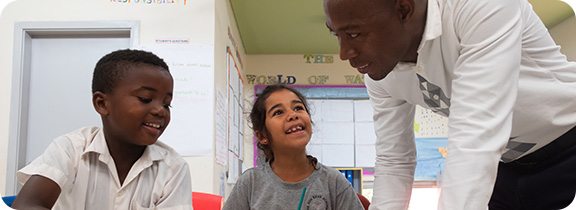
Admission Requirements
Choosing a school is an important decision in a child's and parent's life. We are here to help and answer any questions you might have.
We currently welcome enquiries of students for our Nursery, Junior and Senior School.
Our programmes are based on the principles and practices of the International Baccalaureate. The admission requirements for the Academy's programmes, including language requirements, are outlined below.
For the Aga Khan Academy Maputo, the admissions process can be followed in either English or Portuguese.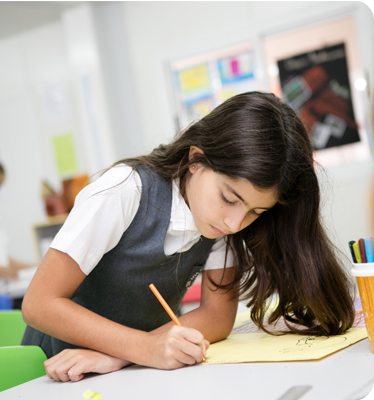 Admission is competitive and based on student merit, regardless of a family’s ability to pay. The Academy endeavours to meet the demonstrated financial need of each admitted student.
Admission is competitive and based on student merit, regardless of a family’s ability to pay. The Academy endeavours to meet the demonstrated financial need of each admitted student.
Nursery School
Kindergarten 1, 2 and 3: Early Years Programme
Students entering Kindergarten 1 must be 3 years of age by the 31st of August of the year of entry.
All prospective students must demonstrate the potential for high achievement. Each applicant will participate in a variety of assessment exercises.
Students may enter the nursery section without a strong prior knowledge of one of the languages of instruction, English or Portuguese.
Junior School
Grades 1–5: Primary Years Programme (PYP)
Students entering Grade 1 will ideally have completed at least three years of nursery school and must be 6 years of age by the 31st of August of the year of entry.
All prospective students must demonstrate a potential for high academic achievement and competency in literacy and numeracy. Each applicant will participate in a variety of assessment exercises.
Students may enter the first three years of the PYP without a strong prior knowledge of one of the languages of instruction, English or Portuguese. However, in the last three years of the PYP, students must have a basic level of proficiency in both languages before they may be admitted.
Senior School
Grades 6–10: Middle Years Programme (MYP)
All students applying for a place in the Senior School must have attained high scholastic achievement in their former educational institutions. They must also demonstrate a keen interest and participation in community service projects outside the classroom and/or extracurricular activities such as sporting activities, clubs, arts and music.
All prospective students must demonstrate a potential for high academic achievement and competency in literacy and numeracy at the school in addition to providing past student grade reports and certificates of achievement.
Grades 11–12: Diploma Programme (DP)
Applicants for the Diploma Programme must have demonstrated outstanding academic achievement as well as a record of active involvement in extracurricular and community service activities.
New students will not be accepted in the year of the Diploma exam
Applying to the Academy
For further information about admissions, please contact admissions.maputo@agakhanacademies.org.
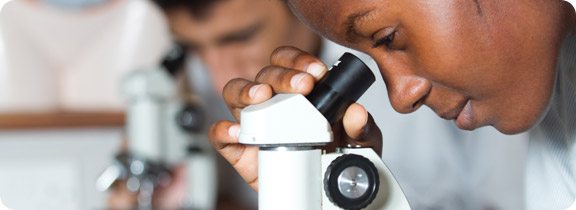
Admissions Forms to Download
If you are having difficulty accessing our online enquiry service, you can also download the package and forms here.
Age requirements
Please see the age requirements that will apply over the following years for entry to the Academy.
2012-13 2013-14 2014-15 2015-16 2016-17
Junior School
Years 1–6: Primary Years Programme
Students entering year 1 should have completed at least three years of Nursery School and must be 6 years of age by 31 December of the year of entry.
All prospective students must demonstrate a potential for high academic achievement and demonstrate competency in literacy and numeracy. Each applicant from year 2-5 must sit a standard assessment in logic, English (reading and writing), mathematics and creativity and supplemented by personal interviews with key members of the Junior School staff.
Senior School
Years 7–10: Middle Years Programme
All students applying for a place in the Senior School must have attained high scholastic achievement in their former educational institutions. They must also demonstrate a keen interest and participation in community service projects outside the classroom and/or extracurricular activities such as sporting activities, clubs, arts and music.
All applicants must schedule an appointment for a standard assessment test in logic, English, mathematics and problem-solving at the school in addition to providing past student grade reports and certificates of achievement. Applicants will also have personal interviews with key members of the Senior School staff as part of their application process.
Diploma Programme
Years 11–12: Diploma Programme
Applicants for the International Baccalaureate (IB) Diploma Programme at the Aga Khan Academy Mombasa must have demonstrated outstanding academic achievement (with a minimum of an average B grade from their current school) as well as a proven record of civic mindedness and participation in community projects.
The application process requires prospective students to undergo a standardised assessment test in English, mathemathics and logic as well as an interview with IB Diploma Programme coordinators and key members of Senior School staff.
New students will not be accepted in the second year of the diploma programme.
Academy tours are held regularly throughout the school year. For more information about applying to the Academy, please contact the admissions office. You can call the admissions team on their direct lines: +254 (0) 736 200 008 or +254 (0) 733 121 927.
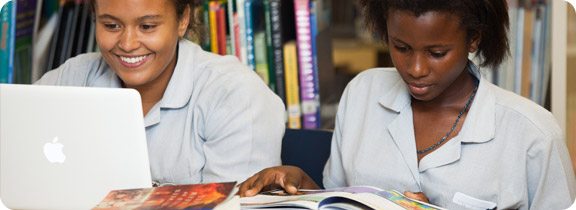
University Counselling
The Aga Khan Academy Mombasa’s University Counselling programme offers students a vast array of resources designed to help them find good matches between themselves and universities/colleges. These resources include a dynamic and well-resourced college counsellor, a wealth of printed, video and online tools and a series of informational workshops and seminars on topics central to the college discovery process.
Our counsellor engages students in individual conferences that are designed to help students reach a greater awareness of who they are. Armed with the well-articulated sense of self, students are prepared to find universities or colleges that are the best fit. Ours is a student-centred approach, and we believe that the likelihood of satisfaction with their choices is enhanced when students are empowered to 'own' the process. Also key to success is good communication among all parties: students, parents and college counsellors. While outcomes are important, it is the process of self-discovery and college-discovery on which our programme focuses.
The Aga Khan Academies University Counselling Handbook has been prepared in order to orient students to the complex and exciting process of university application and selection. The handbook provides definite guidelines and schedules that will help students comprehend the many issues and challenges they will face in their last years of secondary school. It is designed to provide the beginning steps and an outline of the application process and curriculum in various countries.
The handbook serves as a road map that will guide students as they embark on the transition from the Academy to university. It will be helpful only to the extent that students take advantage of the information it contains. The book does not replace the help of the University Counselling Office. However, it does provide answers to frequently-asked questions, it can help students organise their thoughts about university and, in general, it can eliminate much confusion if time is taken to read it and incorporate its recommendations into university planning.
For further details, please contact our University Counsellors via email:
Lucinda Ochieng – University Counsellor: lucinda.ochieng@agakhanacademies.org
Paula Russell – University Counsellor: paula.russell@agakhanacademies.org
University Counselling: university.counselling@agakhanacademies.org
The Aga Khan Academy Mombasa works with a number of High-Achieving Low-Income African students through our school's generous financial aid and Talent Identification Programme. As such, we are a member of the HALI Access Network.
Asad Bogani: The Adventure of a Lifetime
Leaving one’s home and family is a daunting task for any person, but even more so for children. However, the lure of a better education and a new adventure can provide ample motivation for students to leave everything they know and follow their dreams.
For grade nine student Asad Bogani leaving his family and friends in Dubai and traveling to India to attend the Aga Khan Academy (AKA) in Hyderabad was a personal decision rooted in a need to become his own person.
“It was something of a personal decision on my side. I really love Dubai [it is] my home, but I thought I should try something out of my comfort zone. I decided I should be on my own now and live by myself.”
The AKA has allowed students to not only have access to a world-class education but also activities that will help them with interpersonal growth. “I play football, volleyball, a bit of basketball, but my favorite sport is cricket,” says Asad, who is looking forward to playing cricket at the Academy.
Beyond extracurricular activities the students’ time is also taken up by personal chores. “There’s so many activities going on and you have your own life, like cleaning your cupboard and keeping neat; a lot of things happening as compared to my life in Dubai,” explains Asad.
Though Asad is finding lots to enjoy about his experience at the AKA there are always challenges to uprooting oneself from familiar surroundings. “My parents really miss me and I’m really missing home as well, but they’re supporting me and what I’m trying to do here,” he says.
But a little bit of homesickness is a small price to pay for a future that he will now be able to look forward to, one he hopes will mesh his love for sports, especially cricket, with his favorite subject—Mathematics.
“Maths is really fun to do. I’d love to do something related to Maths, like statistics and join it with sports, like a sports statistician, something related to cricket because that’s my love. I’d really like to combine the two of them and work towards making that as my career. After completing my diploma program here I’m aiming for university in England and onto my career.”
With ambitions and an educational foundation that will go the distance, Asad is well on his way to creating the life he’s imagined for himself.
Aashish Dhammani (Class of 2015): Student into teacher
Read below about alumnus Aashish Dhammani's unique experience as an intern at the Aga Khan Academy Hyderabad.
As an intern at the Aga Khan Academy Hyderabad, you are immersed in the everyday life of teaching and learning amidst some extraordinary intellectuals. As an Academy graduate, I have valued diversity in thoughts, lifestyles and priorities. In the last three months and 14 days, that was put to the test. Every day has been a learning experience; be it with peers or among guests with immense wisdom, my storehouse is now filled with a plethora of knowledge.
Interning under the Dean of Students Aaron Jacob, my internship focused on academic support for the International Baccalaureate (IB) Diploma Programme students in history and the theory of knowledge. Additionally, I was a dorm parent trying to balance a variety of academic and personal issues in student life. In the process, I have developed skills in time management, communicating in a working environment and organisation and resilience under pressure. I was also involved in the facilitation of the Academy's yearbook for 2016, interaction with visitors, assisting in the making of the first IB Middle Years Programme film and various Senior School events.
In my time here, I have grown to value the time, energy and knowledge that goes into the profession of teaching, which unfortunately is not widely respected across our Indian subcontinent. I also realised that as a teacher, you work equally as hard as any student in your class. In the future, my goal will also be to change the stereotypical image of a profession which is as challenging, enriching and rejuvenating as any other valuable profession. Teaching is reliving every day and growing individually.
The Academy is an environment that challenges and nurtures leaders who are fearless, courageous and stewards. I have always envisioned growing up to be one myself. After this internship, I am confident my dream is not too far removed. I will continue to motivate myself to grow, beat the odds, acknowledge diversity and tap into the unfathomable.
I am ready to take on another journey from oblivion to self-discovery!
Samson Suhas – swimming to a better life
“I came to this school searching for better opportunities and better facilities through which I can improve in sports and excel in music and studies,” says Samson. “I didn’t have these opportunities in my previous school and didn’t get a chance to play any sport.”
Samson Suhas Srungarapti, a grade 10 student at the Academy and a professional swimmer, represented Rangareddy district at the 2nd Telangana State Winter Aquatic Championship held in Khammam district in December 2016. He came away with the bronze medal in 100mts free style and a renewed desire to participate in not just regional, but national swimming tournaments. This was the first time he had participated in a state tournament.“I want to be an Olympic swimmer. I want to win medals in Olympics for India. And alternatively, I love music and would like to be a music director or a music teacher in the future,” expresses Samson, who trains at the Academy pool for four hours a day when school is on, and six during holidays. “My father is my coach and my role model. He is my inspiration for choosing sports as my career. Without his support and commitment, I wouldn’t have achieved as much as I have in my swimming career from when I started in December 2015 till today.”
Samson has joined a swimming club for extra support and to get his know his competition better. When he is not training, he enjoys playing football with his peers, and remembers the moment the school team won the interschool football tournament as one of the most rewarding experiences at school. His favourite subject is Mathematics, because he loves the challenge of solving a tough problem. Besides swimming, music is his other great love.
“I find the Aga Khan Academy very balanced in giving opportunities for students to develop their skills in academics as well as sports, and that is the most unique thing about this school.”
Samson feels confident of participating at a national level in 2017, and determined to continue working hard on his speed, endurance, and agility even if it involves longer training hours. He has his eyes set on the international swimming circuit, and we wish him all the very best!
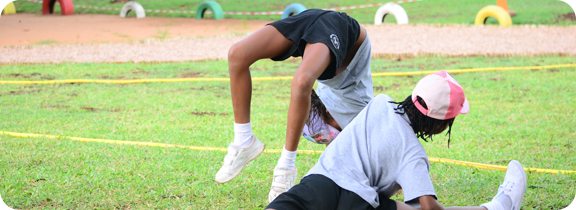
Co-curricular Programmes
Co-curricular programmes enable students to realise their potential in a variety of settings beyond the classroom. Students develop a sense of self-awareness and an understanding of school and community needs and opportunities. They also learn how to apply their gifts and skills to make a positive impact.
At the Academy, we believe in a balanced, rounded, comprehensive school experience. As this includes both academic and co-curricular experiences, we encourage our students to do their best both in and outside the classroom.
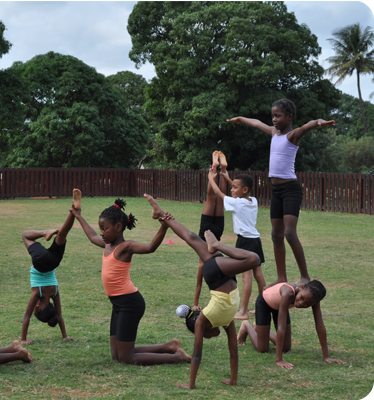 We will offer outstanding sports facilities that will include:
We will offer outstanding sports facilities that will include:
- swimming and diving pools
- cricket, soccer and hockey pitches
- basketball and volleyball areas
- tennis and squash courts
- dance studio
- gymnasium
- athletics tracks.
Children with special sporting gifts will be encouraged to develop their talents in every way. Children with special gifts in music, art or drama will similarly be encouraged through opportunities to practise and perform while at the Academy.
Our co-curricular programmes are clustered into three main streams, each with a different focus:
Creative expression
Whether through visual or performing arts, this cluster engages students to think creatively and express their identities and thoughts aesthetically. Through theatre, art, music and drama, students learn to work together and infuse their projects with values and lessons from other parts of their schooling. Individual and collaborative creative projects emphasise growth and development through personal challenge, ultimately resulting in achievable personal goals.
Action
The student as a reflective practitioner is a basic tenet of the action cluster. Through physical sport – both competitive and non-competitive – students are challenged in their physical growth, and learn values such as good sportsmanship, teamwork and ethical behaviour. We encourage them to extend themselves by trying different activities and working with teammates to pass on their knowledge. In line with developing the student as a whole, a healthy lifestyle complements and enhances academic achievement.
"The Academies will be concerned with the whole of the human being – mind, body and spirit – and with the broad range of human aspiration – intellectual, moral, artistic, physical and spiritual. The fact that these are residential academies will contribute enormously to these broad objectives, encouraging students to identify more completely with the school, to help lead it and shape its environment."
Citizenship
At the Academy, we encourage knowledge and understanding of humanity and civil society. Through their involvement in citizenship activities, students gain an understanding of the practical implications of their work and study. By collaborating with community groups on sustainable projects, they develop an appreciation for human rights and human dignity, and of how their actions impact the world around them.
To learn more about the Academy's programme, please visit the Academic Programme page.
